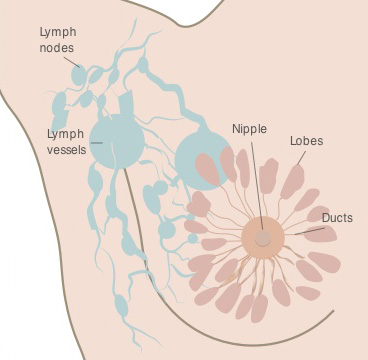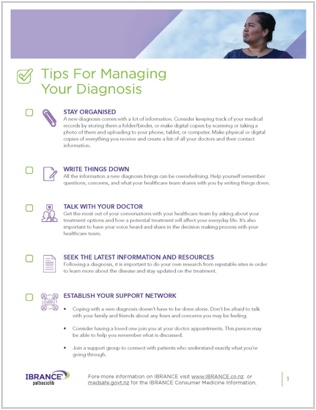An advanced breast cancer diagnosis may feel scary, but we’re here to help. There are resources to help you understand and manage your diagnosis.

Understanding Your Diagnosis
What type of breast cancer do you have?2
There are many different types of breast cancer. It’s not the same for everyone and the treatment you receive depends on a variety of factors such as:
- 1.Where the cancer is located in the breast
- 2.Whether the cancer has spread to other areas of the breast
- 3.If the breast cancer has spread to other areas of the body
- 4.The cancer’s subtype
What is advanced breast cancer?
Breast cancer is when cells in the breast grow in an uncontrolled manner. Eventually, these cells will form a lump called a primary tumour. If the cancer spreads beyond the breast to other parts of the body, this is known as advanced, metastatic, secondary, or stage 4 (IV) breast cancer.
What stage is your breast cancer?2,5
There are different stages of breast cancer. These stages are determined by the size of the tumour and if it has spread to a certain number of lymph nodes or other areas of the body.
Early or primary breast cancer
Cancer is small and located in the breast. A few cancer cells may be found in the lymph nodes.
Early or primary breast cancer
Cancer is a moderate size and located in the breast. Cancer can also be found in the lymph nodes.
Locally advanced breast cancer
Cancer is larger and located in the breast and the lymph nodes. If locally advanced, cancer has spread to the chest wall.
Secondary, metastatic or advanced breast cancer
Cancer has spread to other parts of the body such as the lungs, liver or bones.
What is my subtype?
Doctors will also test cancer cells to find the tumour’s subtype. This helps them to decide which treatment or treatments will be most suitable. The subtype of your breast cancer will depend on whether certain receptors are present on your cancer cells. 3,4 These receptors are:
Hormone Receptors (HR)3,4
Hormone receptors, including estrogen receptors (ER) and progesterone receptors (PR) are present on the surface of cancer cells. Depending on the level of hormone receptors and how your tumour responds to these hormones, your subtype will either be defined as HR- (low levels) or HR+ (higher levels).
Human Epidermal growth factor Receptor 2 (HER2)3,4
HER2 is a receptor found on the surface of cancer cells. Depending on the level of HER2 protein, your subtype will either be defined as HER2- (low levels of HER2) or HER2+ (higher levels of HER2).
Your subtype will therefore be defined as one of the following:
HR+/HER2-
HR+/HER2+
HR-/HER2+
HR-/HER2-
Commonly known as ‘triple negative’ due to the lack of ER, PR and HER2
The subtype of your cancer can help your doctor decide which treatment will work best for you.
How is advanced breast cancer diagnosed?
There are various tests that your healthcare provider might organise to confirm your diagnosis, which may include:
 Blood tests that may detect any abnormalities
Blood tests that may detect any abnormalities Imaging tests, such as an mammogram, MRI, CT scan, and ultrasound
Imaging tests, such as an mammogram, MRI, CT scan, and ultrasound A biopsy using tissue or fluid samples to confirm the presence of cancer
A biopsy using tissue or fluid samples to confirm the presence of cancer Additional cancer lab tests to help determine the subtype of the cancer2
Additional cancer lab tests to help determine the subtype of the cancer2
Treatment Considerations
After a diagnosis of advanced breast cancer, your doctor will discuss with you the type of cancer you have and the treatment options that are most suitable. However, everyone is unique so it’s important that your doctor is aware of what matters most to you in regard to your cancer treatment.
By communicating your treatment goals, you and your doctor can work together to develop a treatment plan that is right for you. Whilst this may sound daunting at first, the more you’re involved in helping to make decisions about your own treatment, the more confident and reassured you will feel.
-

What To Consider
While you want to choose a treatment that is effective, it’s also important to understand the side effects and how it may affect your lifestyle. Talk with your doctor about which treatment may be right for you.
-

Know Your Subtype
Knowing your subtype is important because there are different types of advanced breast cancer. Your doctor can give you a test and, based on the results, tell you which type of advanced breast cancer you have.
-

Partner with Your Doctor
As you begin to weigh options, it’s important to have your voice heard and to share in the decision-making process with your doctor. They know the science and details of your treatment options, but only you know your concerns and goals.
There is currently no cure for advanced breast cancer,5 but there are treatments that can shrink the cancer or slow its progress for some time.3
You will likely have a lot of questions with regards to treatment options available to you. It’s important to talk with your doctor about your treatment decisions and about any concerns you may have.
You may be able to participate in a clinical trial of a new medication. Ask your oncologist if there are any trials which may be appropriate for you.
Tips & Support
You’ve just found out you have advanced breast cancer and you may be thinking, "What now?" Give yourself time to process your diagnosis. You may be feeling overwhelmed, so this tips sheet is designed to help support you as you manage your diagnosis.
Newly Diagnosed Tips Sheet
Questions to ask your doctor with regard to your treatment
It’s important to tell your doctor what’s important to you during your treatment. This will help ensure you get the most appropriate treatment and care. To help you remember everything you’d like to talk to your doctor about, download our Doctor Discussion Guide form and take it with you to your next appointment. You may wish for a family member or friend to complete this form for you and accompany you to your next consultation
Download the form here
Do you have questions about advanced breast cancer
Your questions answered
Right now, advanced breast cancer is not curable but with the right treatment, the growth of the cancer can be reduced.6 Many patients can experience prolonged survival with good quality of life.6 Therefore, it is important to detect it and start therapy as early as possible.
Life expectancy depends on many factors and is difficult to predict. Each patient and the way their cancer may progress is different.7 However, treatments are continuing to evolve and more people are living longer with advanced breast cancer.7 Your doctor will be able to talk to you about what you might expect.
Advanced, metastatic, Stage IV and secondary breast cancer are all terms used to describe cancer that has spread beyond the breast to other parts of the body.7
Metastasis (cancer cells spread to other parts of the body) occurs when cancer cells grow and need more space and nutrients.8 Although the immune system will attack these cells, some will escape and grow in other areas of the body.8 It is unknown why some people get metastases, and others do not.8
Breast cancer has several subtypes.3 It is important for your doctor to know your subtype as it helps outline likely outcomes and the way that the cancer can be managed.3 Knowing your subtype can also help you understand which treatments you might be eligible for.3
Your doctor or nurse will be the best source of information about treatment options. The resources on this website provide some information on advanced breast cancer, understanding your diagnosis, and IBRANCE as a treatment option.
You may need to visit the hospital several times for scanning, therapy, tests, as well as follow-up appointments with members of your assigned care team and other specialists like dietitians or physiotherapists.
It is important to speak to your doctor about all your treatment options and how frequently you are able to travel to the hospital. Remember – contact your doctor or specialist nurse if you have any concerns between hospital visits. You should also contact them if you notice any new symptoms.
Maintaining a healthy lifestyle is important for your overall health. However, potential side effects of the treatment may alter the way you feel and what you are able to do. Speak to your doctor about what can be done to alleviate symptoms and help you to keep doing the things in life that matter most to you.
There are many factors to consider when deciding which treatment is right for you, and it’s important that you’re properly informed regarding treatment choices. Speak to your doctor, nurse or other members of your care team.
You can still enjoy a holiday but it’s important that you check with a member of your care team before going away – especially if you have recently had surgery, chemotherapy or radiotherapy or if you wish to travel outside of New Zealand. Remember to take enough of your prescribed medicines with you and check your health insurance.



